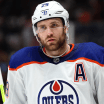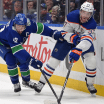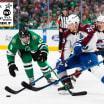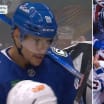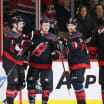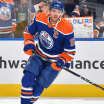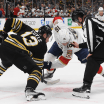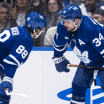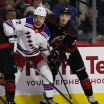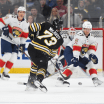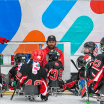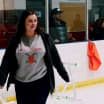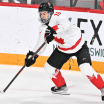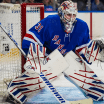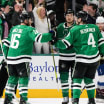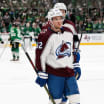NHL.com's Q&A feature called "Five Questions With …" runs every Tuesday. We talk to key figures in the game and ask them questions to gain insight into their lives, careers and the latest news.
The latest edition features former Ottawa Senators captain Daniel Alfredsson:
GOTHENBURG, Sweden -- They sat together on the far side of the arena, away from the media, Daniel Alfredsson, Nicklas Lidstrom and Mats Sundin, three Swedish legends, two already in the Hockey Hall of Fame and one potentially on his way, watching a team they had a hand in creating go through its first workout in advance of the World Cup of Hockey 2016.
Five Questions with Daniel Alfredsson
Former Senators captain reflects on hometown, construction of Team Sweden for World Cup
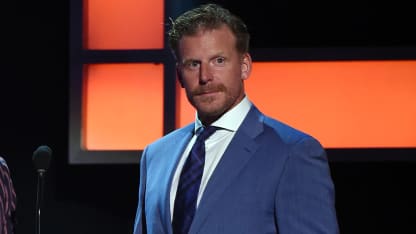
© Ethan Miller/Getty Images
Only one of them could say he felt at home.
Alfredsson, the former Ottawa Senators captain, grew up in Gothenburg, went to high school not far from Scandinavium and played for the Frolunda Indians, the Swedish Elite League team that plays out of this arena. You didn't have to be there to picture the smile on his face as he watched his national team skate together for the first time in his rink, in his hometown.
"It's a lot of fun for me and it's good for this city too," Alfredsson said. "Usually the national team is in Stockholm, but we're going to be here for just over a week so it's real exciting."
Alfredsson, who recently moved with his family back to Ottawa full time, serves as an advisor to Team Sweden along with Lidstrom and Sundin. He spoke about his role, being back in Gothenburg, and his expectations of the World Cup in an interview with NHL.com on Monday.
Here are Five Questions with…Daniel Alfredsson:
Gothenburg is home for you. What's it like to be back in your backyard, the rink you can still call home, with Team Sweden, but this time in an advisory role?
"It is a little surreal, but it's also awesome. It's almost full circle, starting my career here obviously, playing in this rink and now coming back when the career is over to be involved again. This is really where my pro career started. Coming in here and playing in front of a full 12,000 people, that was like, 'Wow, I made it.' It was the Swedish Elite League. That was my goal, Swedish Elite League and the national team. Walking down here this morning, I'm walking with a big smile because it brings back a lot of memories."
What has it been like for you to be in this advisory role? Has it been a hands on role?
"We've been part of it from the beginning. Tommy Boustedt and Rikard (Gronborg), the head coach, they've been really good from the beginning with what they expected from us, what they wanted and what our role would be. We've been sounding boards for whatever logistical things because of the experience me, Mats and Nicklas have from playing in all these tournaments. We've also been scouting, helping to pick the team. Especially with me being based in North America, working with Ottawa, I watched a lot of hockey last season, paid a little bit of extra attention to the Swedish guys, obviously, and held an open dialogue all year long. Now as we get closer I think it's nice to be involved in everything and not just a figurehead. It's been fun. You invest emotionally everything into it. We had meetings in Stockholm at the end of May picking the final team, the final seven. That was a big day to take all the work and pick the team. We had meetings in August with the team. And now to finally be here it's great to start. We had meetings Saturday and Sunday and now we finally are practicing, so now it's on. I'm sure everybody that's involved, a lot of media guys too and other NHL and NHLPA staff, are probably excited that now we finally get some action, some physical presence. It's been a lot of fun. We're excited about the tournament from our standpoint, to see what we can do."
When you have guys like Alex Steen, Niklas Kronwall and Henrik Zetterberg back out, how does it work to find replacements?
"When we pick the team we picked 16 guys at the first cutoff before adding the last seven. The first 16 guys were pretty solid and then the last seven we probably had a pool of 15 guys that we picked from. We ranked them and if there were injuries we had names for each position for who is up next. We were hoping obviously nothing would happen, but knew that it could. Once we knew that Nik Kronwall was out we talked again and said, 'OK, what do we have for our 'D'?' It feel where we had it ranked before."
You played in the '04 World Cup. What is it like to play in a meaningful tournament in September instead of say the Olympics in midseason or the World Championship after the NHL season?
"I think from a player standpoint it's the best setup. Physically you're in great shape. You shouldn't have any nagging injuries. You have more time than you would in the Olympics or World Championship to play together as a team, to practice and really work on how we want to play as a team, forecheck and defending and play in the neutral zone and specialty teams. The hard part obviously is scouting the other teams. Everybody I'm sure is sending scouts to watch all the exhibition games, but everybody knows each other pretty well. I think from a hockey standpoint this should shape up to be the best tournament ever."
That comes from guys being raring to go. Is it easy to ramp it up that fast in September when you're not used to doing that?
"It is. It is. I think this one is also special in terms of every game is in one city. In '04 we played in Finland, Sweden, Philadelphia, so it was a run around. Now you're preparing a training camp in one spot, you travel around a little bit for exhibition games, but you get to Toronto and everybody is there and stays there. It's hard not to get revved up and get ready for it when you're in Canada and you're playing hockey. It's going to happen naturally. Where ever you go people are going to know about you, people are going to ask, people are going to talk about you. Unless you totally forget about the digital age, you're going to get reminded that this is a big deal. I think it's great. I think that part is going to help. The World Cup doesn't have the status of the Olympics yet, but if this turns out to be the tournament it should be I think it has the potential to really be something. They maybe could come back to doing this and if they can get this on a bi-annual basis or every four years, you could look back at it in 50 years if it's still going and it could be a very desirable trophy."
